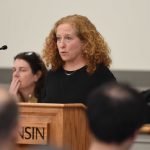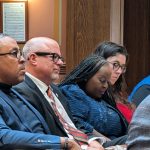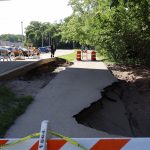Save Taxes With Nonpartisan Redistricting
State taxpayers charged more than $2 million to defend unconstitutional districts.
In a victory for voters last fall, a federal court ruled Wisconsin’s legislative districts unconstitutional and ordered the Wisconsin legislature to redraw voting districts. With the deadline for the new maps now just five months off, Attorney General Schimel has asked the U.S. Supreme Court for a stay of the requirement to draw new voting maps, saying that Wisconsin should not have to “invest the considerable time, effort and taxpayer resources” to comply with the order.
Actually, Wisconsin taxpayers have already “invested” more than $2.1 million dollars to have the unconstitutional districts drawn in secret by a private law firm and then litigated through two lawsuits. The costs continue to spiral now that the case is in the U.S. Supreme Court. We learned recently that taxpayers are on the hook for an additional $175,000 to have private law firms write amicus briefs defending the maps in the Supreme Court.
Meanwhile our neighbors in Iowa have had a legislative agency draw their voting maps since the 1980s at a small fraction of what Wisconsin taxpayers have “invested.” The Iowa maps produced this way have not been challenged in the courts because they have not been drawn to favor one party or the other. This saves taxpayers millions of dollars.
The Wisconsin legislature should adopt a plan similar to that in Iowa. Further, lawmakers should apply the Iowa plan now to redraw the unconstitutional districts.
There are currently proposals before the Wisconsin legislature, Senate Bill 13 and Assembly Bill 44, that would have our Legislative Reference Bureau, the nonpartisan service agency which drafts all legislation, to create new maps. The LRB would have to follow the usual districting criteria mandated by state and federal law, such as compactness, contiguity, respect for existing municipal boundaries, and non-dilution of minority voting power.
The plan also provides for public input, requiring the LRB to hold at least three public hearings about the plan and report on the hearings to the legislature. The legislature would then bring the redistricting bill to a vote shortly after receiving the report, with only corrective amendments allowed. If the initial plan is rejected, the agency must submit a second version in a timely manner. Again, the legislature votes, with only corrective amendments allowed.
Since its creation in 1980, this process in Iowa has operated smoothly and with the support of both parties. Each decade the legislature has enacted the first or second proposed plan. The result in Iowa is some of the most competitive districts in the nation. In Wisconsin, by contrast, none of our congressional districts are considered competitive, and Common Cause in Wisconsin reported in 2016 that just one in ten of our legislative districts could be considered competitive. That discourages good people from running for office and offers Wisconsin voters less choice on Election Day.
Proposals to adopt the Iowa plan have been introduced in the past three legislative sessions, but majority leaders in the Assembly and Senate have not even allowed a public hearing for these bills. These bills deserve a hearing and a vote.
It is high time for Wisconsin to adopt nonpartisan redistricting so that voters can have confidence that they are not being manipulated by politicians seeking an unfair partisan advantage. We encourage citizens to call their state representatives in support of SB13/AB44.
Andrea Kaminski is executive director of the League of Women Voters of Wisconsin, a nonpartisan organization that advocates for informed and active participation in government. Lindsay Dorff is Fair Maps co-leader of Citizen Action Northeast Wisconsin Organizing Cooperative. Follow @LWV_WI on Twitter.
More about the Gerrymandering of Legislative Districts
- Without Gerrymander, Democrats Flip 14 Legislative Seats - Jack Kelly, Hallie Claflin and Matthew DeFour - Nov 8th, 2024
- Op Ed: Democrats Optimistic About New Voting Maps - Ruth Conniff - Feb 27th, 2024
- The State of Politics: Parties Seek New Candidates in New Districts - Steven Walters - Feb 26th, 2024
- Rep. Myers Issues Statement Regarding Fair Legislative Maps - State Rep. LaKeshia Myers - Feb 19th, 2024
- Statement on Legislative Maps Being Signed into Law - Wisconsin Assembly Speaker Robin Vos - Feb 19th, 2024
- Pocan Reacts to Newly Signed Wisconsin Legislative Maps - U.S. Rep. Mark Pocan - Feb 19th, 2024
- Evers Signs Legislative Maps Into Law, Ending Court Fight - Rich Kremer - Feb 19th, 2024
- Senator Hesselbein Statement: After More than a Decade of Political Gerrymanders, Fair Maps are Signed into Law in Wisconsin - State Senate Democratic Leader Dianne Hesselbein - Feb 19th, 2024
- Wisconsin Democrats on Enactment of New Legislative Maps - Democratic Party of Wisconsin - Feb 19th, 2024
- Governor Evers Signs New Legislative Maps to Replace Unconstitutional GOP Maps - A Better Wisconsin Together - Feb 19th, 2024
Read more about Gerrymandering of Legislative Districts here
Op-Ed
-
Wisconsin Candidates Decry Money in Politics, Plan to Raise Tons of It
 Dec 15th, 2025 by Ruth Conniff
Dec 15th, 2025 by Ruth Conniff
-
Trump Left Contraceptives to Rot; Women Pay the Price
 Dec 8th, 2025 by Dr. Shefaali Sharma
Dec 8th, 2025 by Dr. Shefaali Sharma
-
Why the Common Council’s Amended Budget is Good Policy for Milwaukee
 Nov 20th, 2025 by Alds. Marina Dimitrijevic and Russell W. Stamper, II
Nov 20th, 2025 by Alds. Marina Dimitrijevic and Russell W. Stamper, II





















Hmmm…tough choice for the R’s: conserve spending or conserve power?